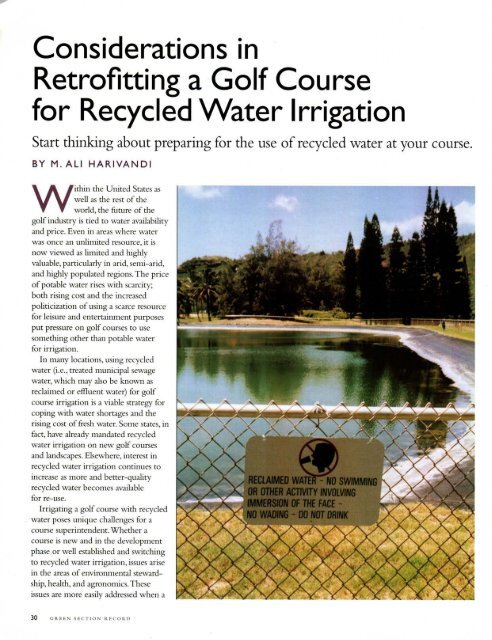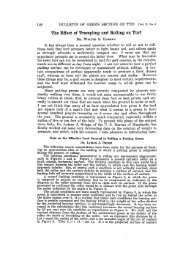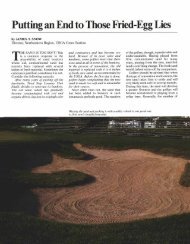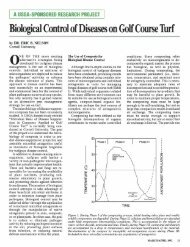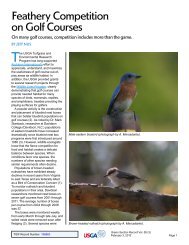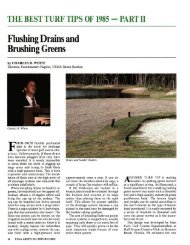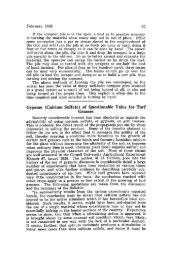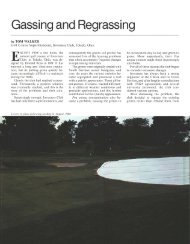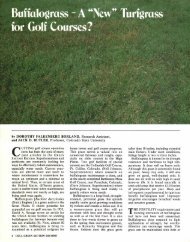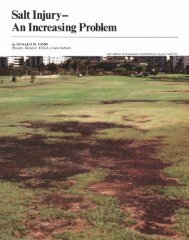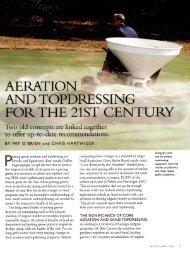Considerations in Retrofitting a Golf Course - USGA Green Section ...
Considerations in Retrofitting a Golf Course - USGA Green Section ...
Considerations in Retrofitting a Golf Course - USGA Green Section ...
You also want an ePaper? Increase the reach of your titles
YUMPU automatically turns print PDFs into web optimized ePapers that Google loves.
<strong>Considerations</strong> <strong>in</strong>Retrofitt<strong>in</strong>g a <strong>Golf</strong> <strong>Course</strong>for Recycled Water IrrigationStart th<strong>in</strong>k<strong>in</strong>g about prepar<strong>in</strong>g for the use of recycled water at your course.BY M. ALl HARIVANDIWith<strong>in</strong> the United States aswell as the rest of theworld, the future of thegolf <strong>in</strong>dustry is tied to water availabilityand price. Even <strong>in</strong> areas where waterwas once an unlimited resource, it isnow viewed as limited and higWyvaluable, particularly <strong>in</strong> arid, semi-arid,and higWy populated regions. The priceof potable water rises with scarcity;both ris<strong>in</strong>g cost and the <strong>in</strong>creasedpoliticization of us<strong>in</strong>g a scarce resourcefor leisure and enterta<strong>in</strong>ment purposesput pressure on golf courses to usesometh<strong>in</strong>g other than potable waterfor irrigation.In many locations, us<strong>in</strong>g recycledwater (i.e., treated municipal sewagewater, which may also be known asreclaimed or effluent water) for golfcourse irrigation is a viable strategy forcop<strong>in</strong>g with water shortages and theris<strong>in</strong>g cost of fresh water. Some states, <strong>in</strong>fact, have already mandated recycledwater irrigation on new golf coursesand landscapes. Elsewhere, <strong>in</strong>terest <strong>in</strong>recycled water irrigation cont<strong>in</strong>ues to<strong>in</strong>crease as more and better-qualityrecycled water becomes availablefor re-use.Irrigat<strong>in</strong>g a golf course with recycledwater poses unique challenges for acourse super<strong>in</strong>tendent. Whether acourse is new and <strong>in</strong> the developmentphase or well established and switch<strong>in</strong>gto recycled water irrigation, issues arise<strong>in</strong> the areas of environmental stewardship,health, and agronomics. Theseissues are more easily addressed when a30 G R E ENS E C T ION R E COR 0 .
course can be designed and built withrecycled water irrigation <strong>in</strong> m<strong>in</strong>d thanwhen an established course decides toretrofit (or convert) to recycled wateruse. In both <strong>in</strong>stances, however, a numberof concerns are best handled dur<strong>in</strong>gthe plann<strong>in</strong>g phase; <strong>in</strong> fact, prepar<strong>in</strong>gfor recycled water irrigation is almostalways more efficient and effective thanmanag<strong>in</strong>g the potential negative effectsof its misuse.Resolution of the follow<strong>in</strong>g <strong>in</strong>frastructureand management issues willensure m<strong>in</strong>imal negative impact ofrecycled water irrigation on the playabilityand agronomic health of a golfcourse. It will also ensure that legal andf<strong>in</strong>ancial responsibilities are carefullyconsidered and all parties are clear ontheir roles and responsibilities shouldproblems arise. Most of these issuesapply equally to courses under developmentand those be<strong>in</strong>g retrofitted forrecycled water irrigation. Every site,however, will also be subject to specifichealth and environmental regulationswhich, due to the great variationbetween sites and communities, are notdiscussed here. Readers are thereforeadvised that the follow<strong>in</strong>g discussion isnot exhaustive with respect to suchissues, complete evaluation of whichshould occur before contractssigned.RECYCLED WATERTREATMENT PROCESSRecycled water used for golf courseirrigation must be at least secondary,and preferably tertiary, treated wastewater.Secondary treatment is a biologicalprocess <strong>in</strong> which complexorganic matter is broken down to lesscomplex organic material, then metabolizedby simple organisms that arelater removed from the wastewater.Secondary treatment can remove morethan 90 percent of the organic matter<strong>in</strong> sewage. The secondary liquid effiuentis always chlor<strong>in</strong>atedareor otherwisedis<strong>in</strong>fected before release. Often, sewagetreatment facilities associated with residentialdevelopments consist of aeratedlagoons, a less sophisticatedsecondarytreatment process.Advanced wastewater treatment consistsof processes similar to potable watertreatment, such as chemical coagulationand flocculation, sedimentation, filtration,or adsorption of compounds by abed of activated charcoal. Becauseadvanced treatment usually followshigh-rate secondary treatments, it is"""-,- ,:.; '",".- ..sometimes referred to as tertiary treatment.These processes can providehighly purified waters. Reverse osmosis,an advanced method of water treatment,can actually produce pure water;however, very high <strong>in</strong>itial and operationalcosts and environmental problemsrelated to disposal of reject sal<strong>in</strong>ebr<strong>in</strong>e limits the use of this process forgolf course irrigation.Generally, secondary and tertiarytreated waters do not differ significantlychemically - i.e., <strong>in</strong> their dissolved saltcontent. However, due to the greatlyreduced level of suspended (i.e., notdissolved) solids, tertiary waters aremuch more desirable for golf courseirrigation. Suspended solids can plugirrigation heads and seal sand-based(<strong>USGA</strong> or California type) golf greens,thereby reduc<strong>in</strong>g dra<strong>in</strong>age. Consequently,<strong>in</strong>stall<strong>in</strong>g an efficient filtrationsystem is essential whenus<strong>in</strong>g recycledwater for golf course irrigation, especiallyif the recycled water is onlysecondary treated effiuent.AGRONOMIC ANDMANAGEMENTCONSIDERATIONSFOR RETROFITThere are unique challenges associatedwith us<strong>in</strong>g recycled water to irrigategolf courses orig<strong>in</strong>ally designed forfreshwater irrigation. Depend<strong>in</strong>g on thequality of the recycled water available,the costs of convert<strong>in</strong>g an irrigationThe issue of water availability system andcont<strong>in</strong>ues to grow and impacts all adapt<strong>in</strong>g course<strong>in</strong>dustries.With ris<strong>in</strong>g costs of ma<strong>in</strong>tenance to thepotable water, the use of new irrigation canrecycled water is a viablebe substantial. Thestrategy. Once thewater arrives at thetreatment facility.itmust receive at leastsecondary, andpreferably tertiary,treatment before itcan be used onthe golf course.cost and managementfollow<strong>in</strong>g items allbear carefulconsideration <strong>in</strong>plann<strong>in</strong>g forconversion of acourse to recycledwater irrigation.Most, have bothconsequences,although some are cost free. Some ofthe items may have already beenaddressed by local authorities - e.g.,regulatory issues. Every effort is madeto <strong>in</strong>clude all items of potentialconcern <strong>in</strong> this report; however, other,site-specific issues that are not apparent<strong>in</strong>itially may come to light as theconversionproject progresses.IRRIGATION SYSTEM ISSUES• Cross connection. Protection ofcross-connection systems may benecessary if the golf course irrigationsystem is connected to a potable watersystem or any dedicated fire l<strong>in</strong>e us<strong>in</strong>gpotable water. In general, all physicalconnections between the recycledwater irrigation system and the potablewater system must be disconnected.• Lakes, wells, and creek protection.On-site lakes, wells, and creekswhose water is used for potable purposesshould be protected from oversprayor runoff from recycled waterirrigation. Dr<strong>in</strong>k<strong>in</strong>g-water founta<strong>in</strong>s onthe property should also be protectedfrom overspray. Local regulations mayrequire modification or redesign of theN ov EMBE R.- D E CE MBER. 2004 31
irrigationsystem to ensure theseprotections .• Quick couplers. It may be necessaryto tag or replace all quick couplerson the course with specialized couplersthat prevent <strong>in</strong>advertent dr<strong>in</strong>k<strong>in</strong>g ofrecycled water by ma<strong>in</strong>tenancepersonnel or others.• Label<strong>in</strong>g, tagg<strong>in</strong>g, and pa<strong>in</strong>t<strong>in</strong>g.On new golf courses, purple irrigationsystem components generally signify(and warn unsuspect<strong>in</strong>g users of) thepresence of recycled water. On exist<strong>in</strong>ggolf courses, all buried components ofthe exist<strong>in</strong>g irrigation system are often"grandfathered <strong>in</strong>." However, a golfcourse may be required to label allvisible irrigation system componentswith purple tape, tags, pa<strong>in</strong>ts, etc. It mayalso be necessary to <strong>in</strong>stall signs warn<strong>in</strong>gof recycled water use <strong>in</strong> more than justEnglish (<strong>in</strong> most cases, warn<strong>in</strong>gs <strong>in</strong>Spanish are also mandatory) throughoutthe course, at the clubhouse and proshop, and on scorecards. The cost of this"publicity" will depend on the typeand magnitude of label<strong>in</strong>g a coursechooses.• Pump<strong>in</strong>g costs. Depend<strong>in</strong>g on thepump<strong>in</strong>g capacity and pressure requirementsof the exist<strong>in</strong>g system, a boosterpump and electricity for additionalpump<strong>in</strong>g may be required. The pressureprovided by the treatment plant releas<strong>in</strong>gthe recycled water is often <strong>in</strong>adequatefor irrigat<strong>in</strong>g a golf course.• Water storage facilities -construction and ma<strong>in</strong>tenance.If recycled water cannot be stored <strong>in</strong>exist<strong>in</strong>g lakes on the course, additionalstorage facilities may be required.Covered storage tanks or "l<strong>in</strong>ed" pondsare options. The size and location ofsuch storage facilities must be thorougWyevaluated <strong>in</strong> relation to environmentalissues as well as for both fIxed andoperational costs. Note: Recycled waterstorage facilities require a high level ofma<strong>in</strong>tenance. Generally, covered (orburied) storage tanks require less ma<strong>in</strong>tenancethan lakes, s<strong>in</strong>ce the absence oflight elim<strong>in</strong>ates algae growth; on theother hand, settl<strong>in</strong>g of suspendedmatteris a problem <strong>in</strong> tanks. With frequencydepend<strong>in</strong>g on water quality, storagetanks must be periodically emptied andcleaned. The <strong>in</strong>itial cost of construct<strong>in</strong>gl<strong>in</strong>ed storage lakes may be less than thatof <strong>in</strong>stall<strong>in</strong>g covered tanks; however, thema<strong>in</strong>tenance cost is generally higher.Due to elevated levels of nutrients suchas nitrogen and phosphorus, algae andweed growth is a constant problem <strong>in</strong>storage lakes. Substantial labor andchemicals are often needed to keeppond water clean and suitable for irri-It is commonplace that purple irrigation systemcomponents generally signify and warn unsuspect<strong>in</strong>gusers of the presence of recycled water.gation. Depend<strong>in</strong>g on the quality of thewater, the cost of ma<strong>in</strong>ta<strong>in</strong><strong>in</strong>g a storagepond for recycled water could beseveral times higher than ma<strong>in</strong>tenancecosts for a pond of potable water (dueprimarily to algae and weed growth,and odor problems). If any exist<strong>in</strong>g lakeat a course is converted for storage ofrecycled water, it may require l<strong>in</strong><strong>in</strong>g toprevent potential groundwatercontam<strong>in</strong>ation.• Irrigation water filtration. Giventhe suspended matter content ofrecycled water, a dependable irrigationfiltration system may be essential.Particularly if recycled water is stored <strong>in</strong>ponds, where algal bloom is a constantproblem, filtration must be of highquality. If the exist<strong>in</strong>g filter system at acourse is sub par, it must be replacedbefore beg<strong>in</strong>n<strong>in</strong>grecycled water irrigation.Without effective filtration, algaeand other suspended matter will plugirrigation nozzles, reduc<strong>in</strong>g irrigationefficiency and uniformity, and requir<strong>in</strong>gadditional labor for repeatedly unplugg<strong>in</strong>gheads. In addition, without adequatefiltration, the fIne, suspendedparticles delivered <strong>in</strong> recycled watermay plug pore spaces <strong>in</strong> the rootzoneof sand-based golf greens, imped<strong>in</strong>gboth dra<strong>in</strong>age and leach<strong>in</strong>g - costlyproblems!• Irrigation water blend<strong>in</strong>g. Recycledwater may need to be blendedwith fresh water to reduce its salt content.If blend<strong>in</strong>g, often done <strong>in</strong> a storagetank or lake, is not possible, a coursemay be alternately irrigated with recycledand fresh water to leach salts (aprocess called "flush<strong>in</strong>g"). Cost andlogistics would determ<strong>in</strong>e whichapproach is used at a given golf course.• Adjacent properties. Depend<strong>in</strong>gon local regulations, golf courses irrigatedwith recycled water may berequired to protect adjacent propertiesfrom runoff or overspray from theirirrigation. Compliance with such regulationsmay mean redesign<strong>in</strong>g the irrigationsystem to allow irrigation of theperimeter with fresh water.AGRONOMIC ISSUES• Recycled water dissolved salts. Inmost cases, recycled water will have ahigher dissolved salt content than thewater already be<strong>in</strong>g used for irrigation.In addition to sal<strong>in</strong>ity, other importantchemical components of the recycledwater are pH, sodium, calcium, magnesium,cWoride, boron, bicarbonate,and residual cWor<strong>in</strong>e. Depend<strong>in</strong>g onthe levels of these chemical constituents,management practices on the coursemay need to change to counteractpotential negative effects on soil, turfgrasses,and other plants. Such effectsmay range from slight to substantial.Without an analysis of the recycledwater, it is impossible to predict theextent of its effect on management;however, any or all of the follow<strong>in</strong>gmay be needed:1. Irrigation water blend<strong>in</strong>g (i.e.,recycled with fresh).2. Injection <strong>in</strong>to the irrigation waterof acids, gypsum, or other amendments.32 GREEN SECTION RECORD
3. Application of gypsum, sulfur, andother amendments to the soil.4. Additional core aerat<strong>in</strong>g to reducesoil impermeabilitysodium levels.caused by elevated5. Installation of additional dra<strong>in</strong>agel<strong>in</strong>es <strong>in</strong> low-ly<strong>in</strong>g areas to removeleached salts.6. Application of additional herbicidesand fungicides to combat weedand disease problems if exist<strong>in</strong>g grassesare stressed by the presence of salt.7.Application of more water than iscurrently applied to leach salt below thegrass rootzone (leach<strong>in</strong>g requirement).8. Regular and more frequent soil andwater test<strong>in</strong>g. Twice a year, soils must belab tested to identify potential sal<strong>in</strong>ityproblems. Soil samples should be takenfrom representative greens, tees, fairways,roughs, and general landscapedareas. Recycled water must be lab testedat least quarterly to determ<strong>in</strong>e the leveland fluctuation of dissolved salts.• Trees, shrubs, and other non-turfplants. Depend<strong>in</strong>g on the recycledwater's salt content as well as the sensitivityof the course's trees, shrubs, andother plants, remedial actions may berequired to prevent plant <strong>in</strong>jury. Themost common remedial practice ismodification of the irrigation system sothat water from spr<strong>in</strong>klers does not wetplant leaves. Although trees and shrubsmay tolerate certa<strong>in</strong> levels of saltaccumulation <strong>in</strong> the soil, they canexhibit <strong>in</strong>jury from sal<strong>in</strong>e water sprayedon their foliage.• Consultant fees. Agronomic issuesrelat<strong>in</strong>g to recycled water can be complex,requir<strong>in</strong>g the <strong>in</strong>put of consult<strong>in</strong>gspecialists. Most golf course super<strong>in</strong>tendentswork closely with a turfgrass waterquality consultant. The cost of such service,as well as lab test fees, is a consistentrecurr<strong>in</strong>g cost associated with recycledwater irrigation, and it should be addedto the management budget.ENVIRONMENTAL ANDMANAGEMENT ISSUES• Groundwater monitor<strong>in</strong>g. If agolf course is locatedabove a dr<strong>in</strong>k<strong>in</strong>gwater aquifer, a comprehensive groundwaterquality monitor<strong>in</strong>g program maybe required if the course is irrigatedwith recycled water. At issue is whetherthe golf course or the sewage treatmentplant is responsible for mount<strong>in</strong>g andpay<strong>in</strong>g for such a program.• Odor problems. Depend<strong>in</strong>g on thelevel of treatment, recycled water irrigationmay cause an odor problem.It should be decided <strong>in</strong> advance whowill be responsible for correct<strong>in</strong>g thesituation .This specialdesignprotectsthe waterfounta<strong>in</strong>fromstruckrecycled" irrigationwater.be<strong>in</strong>g• Liability issues. Although extremelyrare, human health problems, adjacentproperty contam<strong>in</strong>ation, and othernegative impacts may result fromrecycled water irrigation. It is highlyadvisable to determ<strong>in</strong>e ahead of timewhetherbythe golf course or the sewagetreatment plant, or both, will takeresponsibility for such outcomes.• Equipment deterioration. Turfgrassma<strong>in</strong>tenance equipment rusts anddeteriorates <strong>in</strong> other ways more quicklywhen exposed to sal<strong>in</strong>e irrigationwater. How big a problem this may beat a given golf course will depend onthe sal<strong>in</strong>ity of the recycled water.• <strong>Golf</strong> course super<strong>in</strong>tendentcompensation. Switch<strong>in</strong>g from freshto recycled irrigation water will add tothe responsibilities (and therefore onthe-jobtime) of the golf course super<strong>in</strong>tendent.In addition to extra agronomictasks that the use of recycledwater imposes, the super<strong>in</strong>tendent willspend more time <strong>in</strong>spect<strong>in</strong>g,keep<strong>in</strong>grecords, prepar<strong>in</strong>g reports, and fil<strong>in</strong>gdocuments with environmental andregulatory agencies. He will also haveto spend more time with regulators,community representatives, consultants,laboratories, and vendors provid<strong>in</strong>ggoods or services related to recycledwater. Total labor needs on the course,<strong>in</strong>clud<strong>in</strong>g that of the super<strong>in</strong>tendent,often rise 10-20% when recycled waterirrigation replaces freshwater irrigation,the actual figure depend<strong>in</strong>g on thequality of water used.ADVANTAGES OFRECYCLED WATER• Conservation and availability.Us<strong>in</strong>g recycled water is an excellentmeans of conserv<strong>in</strong>g fresh water. Wateravailability, especially dur<strong>in</strong>g a droughtor other water shortages, is almostguaranteed when us<strong>in</strong>g recycled water.• Cost. Recycled water is almostalways less expensive for golf courseirrigation than fresh water.• Nutrient Content. All recycledwaters conta<strong>in</strong> nutrients required byturf plants (e.g., nitrogen, phosphorus,and potassium). The quantities of nutrientsavailable at a given site and theirimpact can only be evaluated afterrecycled water becomes available andcan be tested for nutrient content. Thislimitation notwithstand<strong>in</strong>g, most recycledwaters conta<strong>in</strong> enough nutrientsto completely elim<strong>in</strong>ate fertilization ofroughs and even fairways, and to substantiallyreduce the fertilizer requiredby greens and tees.AUTHOR'SNOTEUse of recycled water for irrigation is rapidlyspread<strong>in</strong>g worldwide. The author is <strong>in</strong>terested <strong>in</strong>stay<strong>in</strong>g abreast of issues aris<strong>in</strong>g from recycledwater irrigation on golf courses <strong>in</strong> regions withvary<strong>in</strong>g social, environmental, political, andclimatic conditions. Readers are encouraged tocommunicate issues related to recycled waterirrigation that are not covered <strong>in</strong> this article. Theauthor will compile and periodically cover theseissues <strong>in</strong> new publications. The author may bereached at: maharivandi@ucdavis.edu.M.A.u HAI,uVANDI, PH.D., is an environmentalhorticulturistfor the University ifCalifornia Cooperative Extension <strong>in</strong> theSan FranciscoBay Area. He also is amember if the <strong>USGA</strong> Tu1fgrassandEnvironmental Research Committee.NOVEMBER-DECEMBER 2004 33


